Escalating Tensions Prompt US To Postpone Iran Talks
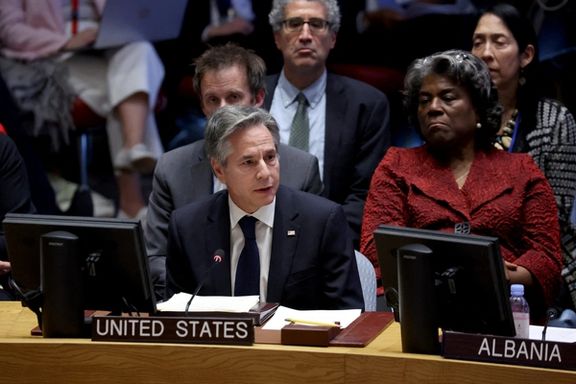
Washington has communicated a potential shift in its stance regarding Iranian assets held in Qatari banks and postponed talks on nuclear issues.

Washington has communicated a potential shift in its stance regarding Iranian assets held in Qatari banks and postponed talks on nuclear issues.
The message was allegedly delivered by Secretary of State Antony Blinken during his visit to Doha on October 13, according to Amwaj Media.
The delay is suspected to be driven by the tensions surrounding the war waged by Iran-backed terror group Hamas on October 7 against Israel when thousands of its militia slaughtered at least 1,400 civilians and soldiers and took at least 220 more hostage.
Since then, attacks have taken place on US bases in Iraq and Syria, with Iran's Yemen proxy, the Houthis, also sending missiles towards Israel since the war broke out, intercepted by the US and Saudi Arabia.
According to Amwaj Media, a source denied the war in Gaza was to blame for the postponement.
In August, Tehran and Washington struck a deal that led to the liberation of five American hostages held in Iran, in exchange for the release of $6 billion in frozen Iranian assets located in South Korea. These Iranian assets were first transferred to Switzerland's central bank for conversion before being subsequently moved to Iranian bank accounts based in Qatar.
The United States has made itself clear in its desire for Iran to stay out of the Israel-Hamas conflict and warned it to control its Lebanon proxy, Hezbollah. It has also pledged its commitment to support Israel as it vows to rid the Gaza Strip of the terror group designated by the US, EU and UK.
As of the time of this publication, the US State Department has not issued an official statement regarding the developments.

Iran’s ruler Ali Khamenei on Wednesday once again praised the militant group Hamas for its terror attack on Israel and said that Palestinians will ultimately win.
Speaking at a gathering in Tehran, the anti-Israel and anti-West leader of the Islamic Republic, also accused the United States of being a partner in what he called Israeli crimes.
With his usual rhetoric, Khamenei said, “The wounded and wrecked occupier regime seeks revenge for the blows dealt by the resilient Palestinian fighters in Gaza, but undoubtedly, despite all the support of the wicked oppressors and the explicit collusion of the Americans in the crimes of the Zionists, all this injustice and aggression ultimately leads to nowhere, and in these matters and future events, victory belongs to the Palestinian nation."
The Iranian regime immediately congratulated Hamas on October 7, as the news of the terror raid and the mass killing of civilians was being received. Later, the government organized street celebrations and began issuing statements of support for Hamas and threats against Israel and the United States.
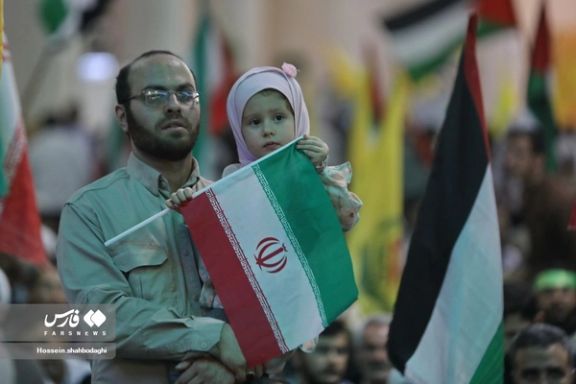
Khamenei on Wednesday described the attack on Israel as “defining and unprecedented.” He stated that with the passage of time, “the irreparability of this operation becomes more evident." He praised the “perseverance of the people of Gaza” and said that this will eventually “defeat the enemy.”
He claimed that leaders of “usurper and oppressor” governments are visiting Israel to save it from complete annihilation. "The evildoers around the world see that the Zionist regime is in a state of struggle and destruction due to the powerful and defining blow delivered by Palestinian fighters. For this reason, they are trying to forcibly keep the wounded and wreaked regime afloat through these visits, expressions of solidarity, and the provision of tools of crime such as bombs and other weaponry."
The 83-year-old Iranian dictator accused the United States of being a “partner in crime” with Israel. "The hands of the Americans are tainted with the blood of children, women, and other martyrs of Gaza, and in reality, the Americans are managing these crimes."
The Biden administration has warned Iran and Hezbollah not to get involved in the fighting and not to expand the war, although the militant Lebanese organization has already attacked some targets in Israel. The administration has deployed two powerful naval task forces in the eastern Mediterranean, which could be a deterrence against a potential barrage of missiles by Hezbollah.
Khamenei also called on Arab and Muslim governments to not lose their will in the face of “Western propaganda” and refrain from calling Palestinians terrorists.
Israel on Wednesday accused Iran of orchestrating recent attacks carried out by its proxies in Yemen, Iraq, and Lebanon in addition to supporting Hamas' war on Israel.
Israeli Chief Military Spokesperson Rear Admiral Daniel Hagari said: “Iran supported Hamas before the war directly, in training, in providing weapons, money and technological know-how. Even in these moments, Iranian support to Hamas continues with intelligence assistance alongside incitement on social media and fueling incitement worldwide against the State of Israel," he said.
Clearly naming Iran as the culprit of regional destabilization, he added; "In the Middle East where the Iranian proxies operate from within Iraq, Yemen and Lebanon, the instructions come from only one place — from Iran."
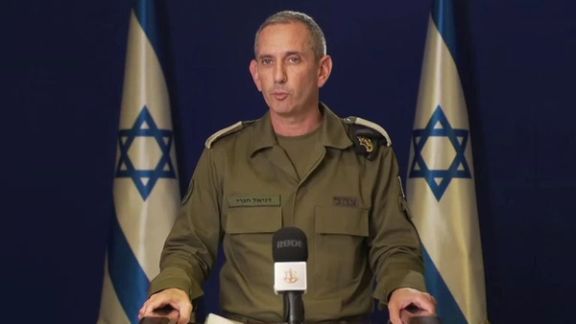
Israel has accused Iran of orchestrating recent attacks carried out by its proxies in Yemen, Iraq, and Lebanon in addition to supporting Hamas' war on Israel.
Israeli Chief Military Spokesperson Rear Admiral Daniel Hagari said: “Iran supported Hamas before the war directly, in training, in providing weapons, money and technological know-how. Even in these moments, Iranian support to Hamas continues with intelligence assistance alongside incitement on social media and fueling incitement worldwide against the State of Israel," he said.
Clearly naming Iran as the culprit of regional destabilization, he added; "In the Middle East where the Iranian proxies operate from within Iraq, Yemen and Lebanon, the instructions come from only one place — from Iran."
While Tehran continues to deny its hand in the war declared by Hamas on October 7, when thousands of Hamas militants stormed Israel by land, sea and air, massacring at least 1,400 and taking around 220 hostages, Hagari warned: "Whomever destabilizes the Middle East for the actions of the Hamas - ISIS criminals, cannot hide.“
Meanwhile, as Iran's biggest proxy, Hezbollah, continues to increase its attacks on northern Israel from Lebanon, the group announced that its leader in Lebanon, Sayyed Hassan Nasrallah, held discussions with top leaders of Palestinian militant factions Hamas and Islamic Jihad.
Hamas deputy chief Saleh al-Arouri and Islamic Jihad chief Ziad al-Nakhala met with Nasrallah as the proxies' alliance continues since Hamas declared war on Israel on October 7.
Iran is Hamas' biggest backer, giving over $100m a year in addition to weapons, technology, expertise, and training, which facilitates its attacks against Israel.
Since the war broke out, Yemen's Houthi militia has fired missiles towards Israel, intercepted by the US and Saudi Arabia. American forces in Iraq and Syria have come under attack from Iranian proxies 13 times in the last week. The US, one of the regime's archenemies alongside Israel, has vowed to support Israel in its war on terror group Hamas leading to a stepping up of Iran's regional militias.

Hezbollah's leader met top counterparts from the Palestinian militant groups Hamas and Islamic Jihad to discuss what their alliance must do to "achieve a real victory for the resistance."
Part of Iran's regional network of proxy groups, the heavily armed Hezbollah has had daily exchanges of fire with Israeli forces along the Israeli-Lebanese frontier since war broke out between Israel and Hamas on October 7. However, Hezbollah has so far not opened a northern front against Israel, despite a heavy bombing campaign in Gaza against Hamas.
The meeting involved Hezbollah's Sayyed Hassan Nasrallah, Hamas deputy chief Saleh al-Arouri and Islamic Jihad chief Ziad al-Nakhala, Hezbollah said in a statement. It did not say when the meeting took place.
"An assessment was made of the international positions being taken and what the parties of the Axis of Resistance must do ... to realize a real victory for the resistance in Gaza and Palestinian and to halt the brutal aggression," Hezbollah said.
"There was agreement on continuing the coordination."
The United States, which has stationed two naval strike groups near Israeli and Lebanese waters, has warned Iran and Hezbollah not to expand the conflict.
Hezbollah announced on Wednesday that two more of its fighters had been killed, increasing the death toll in its ranks to 40 fighters since the start of the conflict.
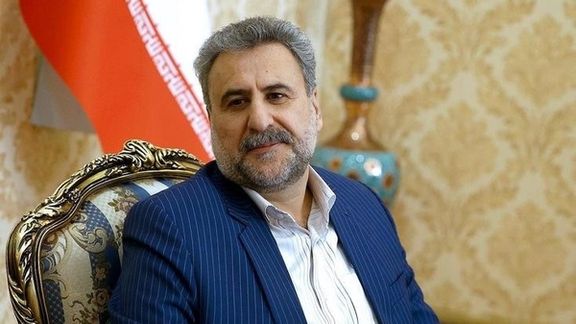
A former Iranian lawmaker has warned that "never before have the conditions for a war between Iran and the United States been as ripe as they are today".
Heshmatollah Falahatpisheh, known for his expertise in nuclear-related matters, made the claims amid an escalating conflict between Iran-backed Hamas and Israel.
The US has mobilized war ships and troops and vowed to do all it can to stand by its ally Israel in the face of a war declared by Hamas -- designated by the UK, US and EU — on October 7.
The former head of the Iranian Parliament's Foreign Policy and National Security Committee warned that such a war would not serve the interests of either nation. Instead, he proposed that both sides should engage in dialogue, suggesting that a 'red table' in Muscat, Oman, could provide a suitable setting for diplomatic negotiations.
Oman has a history of mediating between Western countries and the Islamic Republic. The country has successfully helped facilitate the release of several foreign citizens and dual nationals held hostage by Iran in the past.
Experts believe the key to preventing further regional conflict lies in how the US responds to recent attacks against its forces in the region, 13 attacks on US troops in Syria in just one week, and whether it holds Iran accountable for the actions of its proxies.
However, the central question posed is whether the US threat to intervene in the Hamas war on Israel and if its deterrence strategy are viewed as credible by Iran and its proxies. Hezbollah on Israel's northern border have continued to step up military attacks while the Houthis in Yemen have begun to send missiles towards Israel, intercepted by Saudi Arabia and the US.
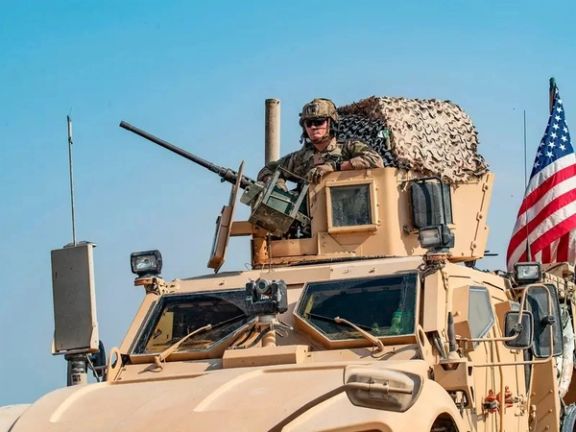
American forces in Iraq and Syria have come under attack on at least 13 occasions over the past week, the Pentagon has confirmed, by militant groups armed by Iran.
In a statement Tuesday, Pentagon's press secretary Brig. Gen. Pat Ryder said the incidents occurred between October 17 and October 24 and involved a combination of one-way attack drones and rockets.
In just one day (October 18), according to US Central Command, 20 American servicemen were injured in a drone attack on Al-Tanf military base in Syria and 4 more in a another drone attack on Al-Asad Airbase in Iraq.
The Department of Defense has so far not attributed these attacks to Iran, but officials have stated that there are "Iranian fingerprints all over it".
It is an open secret that the Islamic Republic Guards Corps (IRGC) plays a prominent role in both Iraq and Syria, funding and equipping various proxies. Iranian officials regularly boast about the IRGC’s ‘reach’ in the region.
The IRGC’s Quds force, responsible for overseas operations, has a history of proxy war with American forces in the Middle East. This latest round has arisen in the wake of Israel’s bombardment of Gaza, which began October 7 when Hamas militants launched a terror raid into southern Israel.
The Pentagon has toughened its tone against the Iranian regime in the last few days. Brig. Gen. Ryder said on Monday that the US would hold Iran ultimately responsible for the attacks in Iraq and Syria.
However, the Biden administration still seems to be reluctant to retaliate, fearing to get itself bogged down in a prolonged and costly regional war that would further destabilize the Middle East.
And this has enraged more than a few lawmakers in Washington.
“Obama and Biden both thought they could appease Iran with billions of dollars. They were wrong,” said Senator Ron Johnson to Fox News Tuesday. “We need to recognize Iran for the malign force it is in the world and stop handing them billions.”
Senator Marsha Blackburn seconded this sentiment. “Biden’s non-response will only incentivize Iran to continue attacking our troops,” she posted on her X account Tuesday night.
Responding to the growing threats against US forces in the region, President Joe Biden ordered two aircraft carrier strike groups and anti-missile defense systems to be deployed to the region. Defense Secretary Lloyd Austin has also issued prepare-to-deploy orders for a number of forces to respond to any aggressions. US had also sent additional naval forces to the Persian Gulf in July to deter Iran from harassing commercial shipping.
“We will always maintain the inherent right of self-defense,” Brig. Gen. Ryder said, “and if there is a response, should we choose to have one, we would do that at a time and place of our choosing.”
The US government is under increasing Congressional pressure to respond to the targeting of its forces in Iraq and Syria. It’s not clear if the American public agrees. It probably will, however, if the attacks on US forces were to continue and especially if American lives were to be lost.
“We need to be striking back,” said Senator Chris Coons to Fox News Tuesday evening, “and we need to be prepared for the very real prospect that this will get harder before it gets easier.”
Senator Coons is a close ally of President Biden. He was shortlisted for Secretary of State alongside Blinken.
The Biden administration has so far avoided military engagement with the IRGC and its proxies in the region. But things could change if Israel goes ahead with its planned ground invasion of Gaza and draws in other actors like Hezbollah to the war scene.
Nearly 6,000 Palestinian have died in Israel's air campaign in Gaza since the October 7 terrorist raid, which killed 1,400 Israelis, mostly civilians.
International calls for unimpeded aid to Palestinians in Gaza intensified Tuesday. The United States and Canada joined almost every other country in the United Nations to appeal for a “humanitarian pause” to get aid to civilians in Gaza.